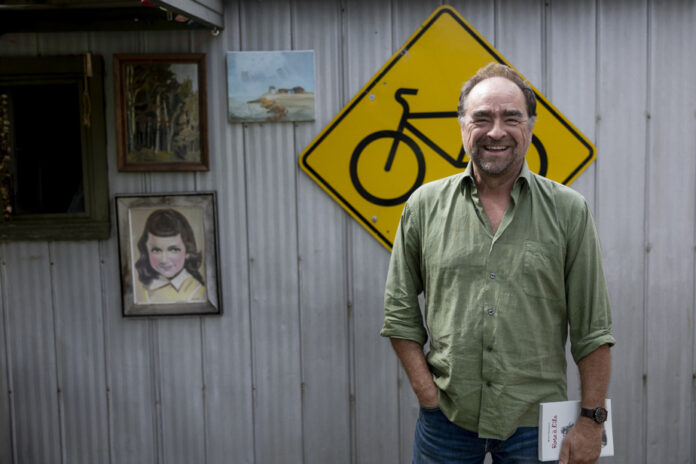We can not blame cartoonist Michel Rabagliati for lacking transparency. In addition to recounting his life in his Paul series, he often announces in advance the next stop on his artistic itinerary. We knew since the publication of Paul – Interviews and comments that he was preparing an illustrated novel. It’s called Rose à l’île and, it’s no coincidence, it arrives in time for “I’m buying a Quebec book” day.
Paul does not give his name to the title of Michel Rabagliati’s new book. It’s not a detail, it’s even a first for the cartoonist, who has been revealing himself for more than 20 years in comics that are at the same time funny, serious, frank and tender. This choice marks a change: rather than telling the story in small boxes, he deploys delicate sketches and adopts a romantic narration.
Those who have been seeing Paul for years know that the Rose in the title Rose à l’île is the narrator’s daughter. The island will never have a name throughout the approximately 250 pages of the book, which recounts a week-long father-daughter vacation spent in the summer somewhere in the middle of the St. Lawrence.
“We did that for four or five summers, just her and me. It’s very rare that I have him with me five days in a row, he says of his daughter, who is almost 30 today. These were beautiful parentheses in my life. »
Rose on the island stems somewhat from the pandemic that Michel Rabagliati, still single since the separation mentioned in Paul at home (2019), has lived in isolation. Telling about these holidays was a way of getting closer to her daughter, if only on paper. “I wanted to talk about her, it’s my look as a father, as much as I can do it,” he says, without explaining again that the tacit agreement he has with his loved ones is to put them in stage while respecting their privacy.
Moving away from the classic comic book format was immediately obvious to the creator. “The island imposed the format on me. How do I fit the ferry, spruce trees, and shore into boxes? It’s all done offshore there, it’s 360 degrees sky, so it didn’t really fit, he explains. This is where I got the idea for the illustrated novel. »
The format – which has something old-fashioned and welcoming – fits perfectly with Paul’s universe, always comforting, even if it is very often impregnated with nostalgia. It also allows the draftsman to let his line live in greater freedom and increased sensitivity. It also allows the author to unfold more. “I felt like talking more,” says Michel Rabagliati.
“I found it tougher than just doing comics,” he admits. I am not Dany Laferriere. Making interesting sentences and texts is an art. I got off no worse, but I stayed at my level. I did not try to play Victor Hugo. »
In Rose à l’île, he watches his daughter grow old, reflects on life as a couple, her wobbly love life and her advancing age. Despite the change in format, readers of Paul will immediately recognize the sensitive tone and the uncompromising look, although tinged with self-mockery, that Michel Rabagliati has on himself. Like the French writer Emmanuel Carrère, the cartoonist does not write to show only his best profile.
In a preliminary version of Rose à l’île, Michel Rabagliati went even further: he discussed his relationships with women at greater length and talked about sexuality at 60. This aroused unease among his publishers who, he said, considered that these passages went beyond Paul’s framework to enter fully into the too intimate life of its author.
Paul, without being asexual, is not a very carnal series, it is true. We are far from the universe of a Jimmy Beaulieu, focused on romantic relationships and desire. “Maybe I will do it in another book, maybe in another format, but I have things to say about it,” says Michel Rabagliati.
And here he is, thinking out loud what’s next and casually announcing what’s likely to come next. “There are things I want to talk about but can’t stretch to 50 pages. It could be interesting to exploit these small themes in short, concentrated stories. Like in Paul on the subway: we take a subject, we go all out and we move on. “See you in three or four years with a Paul in bed?”















